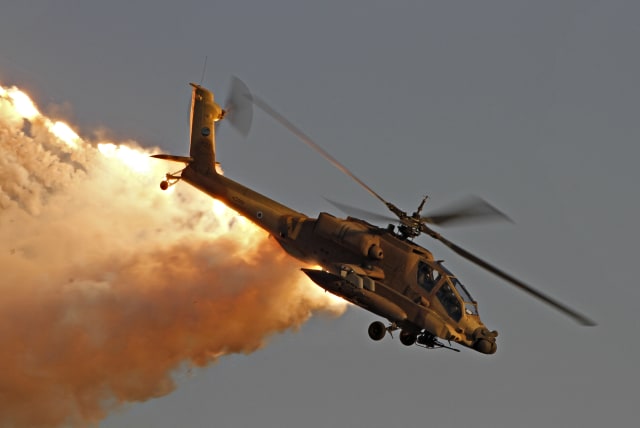Defense officials warn of lengthy procurement process for new attack helicopters

This comes as the Israel Air Force pushed its capabilities to the limit to address UAV threats across multiple arenas and provide support to ground forces.
IDF and defense officials warned of delays in acquiring new attack helicopters and challenges in maintaining the older Boeing AH-64 Apache fleet. These issues arise as the Israel Air Force strains its capabilities to counter drone threats across multiple fronts while supporting ground operations.
The air force initially planned to decommission its AH-64 Apache squadron due to the helicopters' age. However, this decision was reversed after the squadron's critical role on October 7, providing firepower against terrorists within Israeli territory and supporting maneuvering forces in the Gaza Strip throughout various scenarios of the conflict.
One of the main lessons from the war is the fact that the IDF struggled in the initial hours to deploy a significant aerial force to thwart infiltrations of terrorists from the Gaza Strip and their return through dozens of breaches in the border fence.
A key lesson from the war is that the IDF faced significant challenges in deploying a substantial aerial force during the critical initial hours to prevent terrorist infiltrations from the Gaza Strip and their return through numerous breaches in the border fence.
Walla has learned that due to the condition of the helicopters, a decision was recently made to integrate an experienced and professional team of reservists into the Air Maintenance Unit to utilize the helicopters to the fullest.
Air force officers have harshly criticized the decision-making processes over the past decade, particularly regarding the force structure and the deployment of the helicopter fleet in the initial hours of the war.
Furthermore, the officers criticized the alternatives provided by the General Staff for delivering close-fire support and the heavy burden placed on air and ground crews in the attack helicopter units.
This comes as the air force and the Defense Ministry are preparing to procure 15 Apache attack helicopters, with an option to purchase an additional 15.
Recently, the air force and the Defense Ministry sent a letter to the US Defense Department detailing the systems and features the IDF wants to see in the new helicopter.
Defense officials stated that the IDF had assessed that if they approached the US administration and the US military to obtain helicopters from Boeing's production line at their expense, the response would be immediate.
However, the Americans rejected the request, demanded to see the budget, and instructed that the letter of request be rewritten accordingly.
Officials further estimate that the bureaucratic process with the US, as it has developed, will delay the signing of the agreement by about ten months. The agreement aims to replenish the attack helicopter fleet against the backdrop of escalating threats across all fronts, with an emphasis on the drone threat and ground infiltrations.
Sources involved in the procurement process stated, "It is doubtful that the US Army will provide helicopters at its own expense, and if it does, it will demand replacement helicopters from Boeing. Otherwise, it will reduce its own force structure."
According to estimates by defense officials, a helicopter of the Apache Echo model costs $50 million, but in such a process, the US military could demand $55 million to purchase a new one to replace it.
The officials noted that the air force will have to integrate Israeli-made systems into the future Apache helicopter, but this will be conducted as a compromise to shorten the timeline from procurement to integration into the air force. The officials estimated that it is highly likely the IDF will opt for the international version of the Apache attack helicopter.
IDF responds
The IDF said in response, "Since the beginning of the war, attack helicopter squadrons have been engaged in high-quality and significant operational activities, including support for ground forces and neutralizing enemy threats. Since October 7, thousands of reservists and volunteers have joined the war effort, particularly in the air force.
The air force is undertaking a comprehensive force-building effort in coordination with the General Staff and the Defense Ministry, and its results are evident in its ongoing operational activities. The air force is open to and welcomes criticism, ensuring that all detailed and reasoned criticism will be addressed in a substantive manner."
Jerusalem Post Store
`; document.getElementById("linkPremium").innerHTML = cont; var divWithLink = document.getElementById("premium-link"); if (divWithLink !== null && divWithLink !== 'undefined') { divWithLink.style.border = "solid 1px #cb0f3e"; divWithLink.style.textAlign = "center"; divWithLink.style.marginBottom = "15px"; divWithLink.style.marginTop = "15px"; divWithLink.style.width = "100%"; divWithLink.style.backgroundColor = "#122952"; divWithLink.style.color = "#ffffff"; divWithLink.style.lineHeight = "1.5"; } } (function (v, i) { });

